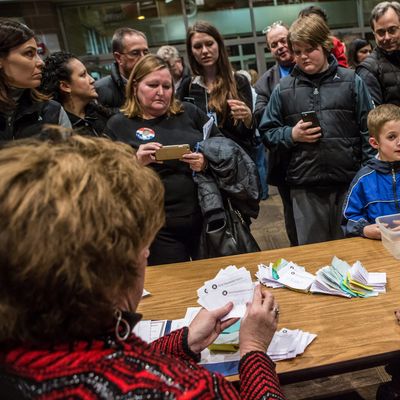
As part of the quadrennial festival of criticism of Iowa’s first-in-the-nation caucus, a change in reporting procedures forced on Iowa Democrats by the national party is getting some derisive attention, as evidenced by this Politico piece predicting a “hot mess” on caucus night:
For the first time in the history of Iowa’s Democratic caucuses, the party will report the raw vote count for each candidate. And because of idiosyncrasies in the caucus process, the person with the most votes at the beginning won’t necessarily be the one with the biggest delegate haul at the end …
In Iowa, traditionally it’s the delegates that matter. And party leaders here emphasize that shouldn’t change: ultimately the presidential primary contest comes down to who gets the most delegates.
But the disclosure of two vote tallies and one delegate count on the night of the Feb. 3 caucuses — a move made to inject more transparency into the caucus process — is threatening to muddle the narrative coming out of Iowa. Depending on how the numbers are interpreted, there’s a scenario in which more than one candidate could claim a “win.”
Before we go too much further down this rabbit hole, it’s important to recognize that it’s possible to have two winners in nearly any primary or caucus state. With many delegates awarded by congressional district, and with minimum thresholds and proportionality requirements affecting both district and statewide delegate hauls, there’s no guarantee the popular-vote winner will also be the delegate winner, particularly when there are more than two candidates (in the early going in 2008, Clinton won the raw caucus vote in Nevada, but Obama won more delegates). Usually the news media focuses on the popular vote, but other interpretations are possible.
Iowa’s coerced decision to begin reporting raw caucus votes was directly the product of post-caucus spinning in 2016 by supporters of Bernie Sanders who claimed their candidate had “really” won in terms of the total number of caucus participants backing him. Since the state party did not compile, much less publicize, raw votes, there was no way to confirm or deny that claim, which of course fed accusations the process was “rigged” for Hillary Clinton (if so it was pre-rigged in about 1976 when Iowa caucus procedures were first developed). And there was another problem: How do you tabulate a raw vote of candidate preferences when the system contemplates two rounds of caucusing in every precinct, one initial round and then a second when nonviable preference groups (those with less than 15 percent of the total) are liquidated and their members become free to realign with one of the survivors? That didn’t much matter in 2016, when the caucuses were dominated by two candidates, but in the larger 2020 field it is an issue.
So in the pursuit of full transparency the Iowa Democratic Party decided it will provide real-time reporting of both raw votes and ultimately the delegate vote, too (actually not a national convention delegate split, but an estimated allocation of state convention delegates — or “state delegate equivalents” — as part of the process leading to the selection of national delegates). And thus the “three winners” scenario that has Iowa-haters more enlivened than ever.
What is feeding this narrative, of course, is polling showing a tight four-way race in Iowa in which Bernie Sanders, Elizabeth Warren, Pete Buttigieg, and Joe Biden are all in a relatively strong position. If it winds up crazy close, then you could have different candidates “winning” by different measurements. Spinners gonna spin. If you step back and consider that Iowa’s real function isn’t to crown “winners” but simply to winnow the field of those with poor organizational or retail political skills, then it’s not that big a deal. There are traditionally thought to be “three tickets out of Iowa” — probably four this year — so it likely doesn’t matter if each ticket-holder can claim a “win.” The minute the caravan moves on to New Hampshire and the other early states, preoccupation with the terrible injustice of Iowa’s primacy will fade until four years from now, when the unholy din will begin again.
At some point maybe those who think it’s absurd to allow caucuses rather than primaries and to give the same states a position at the top of the calendar will get their act together and figure out a way to change it all. If so, they must come to grips with the fact that this is not some sort of national “system” that can be dictated by the DNC, but the product of decisions by state legislatures and state parties with the national party playing a limited role. In the past, complaints about the unrepresentative demographics of Iowa and New Hampshire led to the designation of more-diverse Nevada and South Carolina as fellow-early-states with equally protected calendar status. Complaints about Iowa’s results reporting led to the “three winners” scenario. This non-system “system” continues to evolve, however slowly.






























